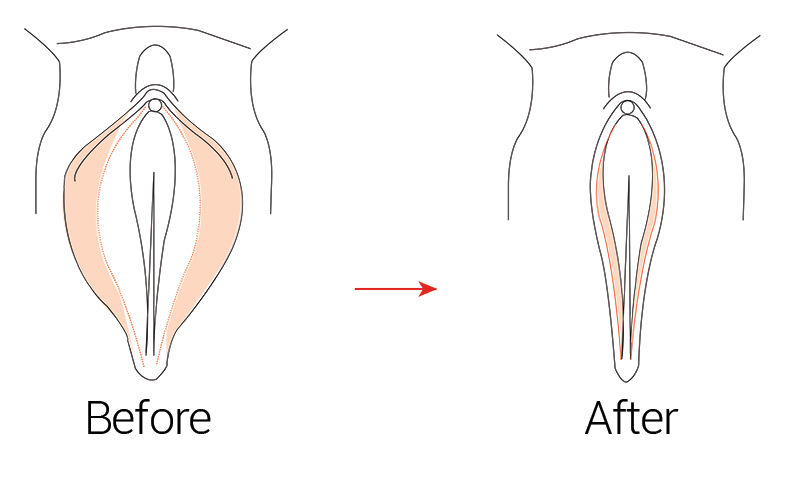Vaginoplasty in Nepal
Search and Compare the Best Clinics and Doctors at the Lowest Prices for Vaginoplasty in Nepal

Find the best clinics for Vaginoplasty in Nepal
No clinics available
Turkey offers the best prices Worldwide
Price: $ 69

- Home
- Nepal
WHY US?
At Medijump, we're making medical easy. You can search, compare, discuss, and book your medical all in one place. We open the door to the best medical providers worldwide, saving you time and energy along the way, and it's all for FREE, no hidden fees, and no price markups guaranteed. So what are you waiting for?

Free

Best Price

Widest Selection

Risk-Free
What you need to know about Vaginoplasty in Nepal

Vaginoplasty can mean a lot of different things. In general, however, it is any surgical procedure performed to construct or reconstruct the vagina. This surgery can be performed to treat numerous situations, correcting congenital defects to the vagina, urethra, and rectum. Sometimes, a vaginoplasty is required after vaginectomy for vaginal cancer in order to restore a normal vaginal function and structure. The surgery can be performed to treat babies born with a microphallus. For cosmetic purposes, it may be done to tighten the vagina after childbirth.
Vaginoplasty can also be performed on transgender and non-binary people who are interested in male-to-female (MtF) sex reassignment surgery. In MtF sex reassignment surgery, vaginoplasty is the process in which a surgeon constructs a vaginal cavity between the urethra and the rectum. Vaginoplasty aims to create a vagina from penile tissue.
Before vaginoplasty, you may have congenital defects to the vagina or you want to tighten your vagina after childbirth or you have had a vaginectomy to treat vaginal cancer. After vaginectomy, all of the problems will be addressed, and the structure and function of your vagina will be restored. If you have the procedure as part of MtF sex reassignment surgery, the procedure may complete your transition.
What does a Vaginoplasty Procedure Involve?
Vaginoplasty may be performed under general or local anesthesia. The anesthesia used for vaginoplasty is mostly determined by the purpose of the surgery.
There a number of different ways to perform vaginoplasty, depending on the purpose of the surgery. If the procedure is performed to tighten the vagina, your surgeon may remove extra skin from inside the vagina and tighten the tissues with strong sutures. Vaginoplasty to construct the vagina, such as for sex reassignment surgery, for women who have had a vaginectomy, or for women who were born without a vagina, several techniques may be offered, including:
- Peritoneal vaginoplasty – the lining of the abdominal cavity, known as the peritoneum, is used to create the vagina. It is usually performed as a laparoscopic procedure.
- Intestinal or sigmoid vaginoplasty – this technique uses a section of the sigmoid colon to create the vagina. It is often performed as laparoscopic surgery.
- McIndoe vaginoplasty – a skin graft is used to line the vagina during this technique. The skin graft is placed on a vaginal mold, then it is placed into a space that has been opened to become the vagina.
- Penile inversion vaginoplasty – this technique is only used in transgender women. It uses the skin from the outside of the penis to create the lining of the vagina. The bulbous tip of the penis is reshaped to make a clitoris and the scrotal skin is used to create the labia majora and minora. The remaining parts of the penis are amputated and discarded.
How Long Should I Stay in Nepal for a Vaginoplasty Procedure?
Vaginoplasty can be a complex procedure and it may last between 7 and 10 hours. Depending on the reason for your vaginoplasty, you may need to stay in the hospital for 3 to 5 days. The recommended length of stay in Nepal is around 2 to 4 weeks because you need to attend follow-up checkups.
What's the Recovery Time for Vaginoplasty Procedures in Nepal?
The patient’s recovery time is different and you should be able to move around within 2-3 days. On average, the total recovery period after vaginoplasty takes around 6 to 8 weeks. During this period, do not take a bath or submerge yourself in water and avoid any strenuous activity. Avoid any sexual activity for 12 weeks. Your doctor will give you the detail of your recovery timeline and when you can resume your normal activity.
What sort of Aftercare is Required for Vaginoplasty Procedures in Nepal?
To speed up your recovery period, it is important that you closely follow the post-operative instruction your surgeon provides. You should always keep your genital area clean and dry. Your surgeon may give you pain medication to help ease discomfort, make sure to take it as prescribed. You may also need to douche one to two times a week using a non-scented vaginal douche.
If you had penile inversion vaginoplasty, your surgeon will give you a vaginal dilator to be used daily at least for a year to maintain the desired vaginal depth. You can use the device as soon as your bandages are removed and your surgeon will give you a dilation schedule.
Remember that you have to wipe or wash the genital area front to back for the rest of your life. This helps prevent infection from the anal region.
What's the Success Rate of Vaginoplasty Procedures in Nepal?
Vaginoplasty is safe and has a high success rate. However, as with other surgeries, the procedure carries some risks and complications. These include bleeding, infection, rupture of the sutures, skin or clitoral necrosis, urinary retention, vaginal prolapse, fistulas, ongoing pain, scarring, and permanent changes in sensation.
Are there Alternatives to Vaginoplasty Procedures in Nepal?
The alternative to vaginoplasty depends on the reason you have the surgery. If you want to tighten the vagina, you may be able to get similar results through vaginal tightening exercise and a healthy diet plan. For trans-women who do not plan to have deep vaginal penetration, a procedure called orchiectomy can be an alternative. This procedure removes the testicles and reduces testosterone levels.
Whilst the information presented here has been accurately sourced and verified by a medical professional for its accuracy, it is still advised to consult with your doctor before pursuing a medical treatment at one of the listed medical providers
No Time?
Tell us what you're looking for and we'll reachout to the top clinics all at once
Enquire Now

Popular Procedures in Nepal
Prices Start From $218

Prices Start From $2,473

Prices Start From $1,795

Prices Start From $889

Recommended Medical Centers in Nepal for procedures similar to Vaginoplasty

- Interpreter services
- Translation service
- Religious facilities
- Medical records transfer
- Medical travel insurance
- Health insurance coordination
- TV in the room
- Safe in the room
- Phone in the room
- Private rooms for patients available

- Interpreter services
- Translation service
- Religious facilities
- Medical records transfer
- Medical travel insurance
- Health insurance coordination
- TV in the room
- Safe in the room
- Phone in the room
- Private rooms for patients available

- Interpreter services
- Translation service
- Religious facilities
- Medical records transfer
- Medical travel insurance
- Health insurance coordination
- TV in the room
- Safe in the room
- Phone in the room
- Private rooms for patients available
Vaginoplasty in and around Nepal
Introduction
Nepal is a country in South Asia, sandwiched between India and China. Home to the mighty Mount Everest, this incredible country has diverse landscapes, from the Himalayan Mountains in the north to the sprawling plains in the south. Towering mountains, charming hill villages, golden mountains, and jungle wildlife, Nepal is truly one of the world’s best travel destinations. Beyond its nature and culture, this country is also increasingly popular for its healthcare. With its affordable high-quality medical facilities, Nepal is considered to have immense potential for medical tourism, due to the availability of good infrastructure, highly trained specialists, modern medical equipment, and relatively cheaper medical treatment. In fact, it’s currently the fastest-growing segment of the country’s tourism. Medical tourists coming to Nepal are usually seeking exceptionally high medical treatment at competitive rates. Some of the most sought after procedures are dental treatments, cardiac services, and neurological treatments.
Popular Cities and Regions in Nepal
Kathmandu, the capital and largest city in Nepal, is historic, enticing, spiritual, and vibrant. One of the most famous attractions in the city is the old town, where tourists can find the most popular Tibetan pilgrimage site, the Kathesimbhu Stupa. Another top attraction is Kumari Bahal, which is the home of the Kumari, the girl who is selected to be the town’s living symbol of Devi. Tourists looking to relax in a more laid-back vibe usually go to Pokhara. Stretching along the shore of an idyllic lake, it offers spectacular scenery. It also boasts a thriving adventure-sports industry, from paragliding to paddle boats. Anyone who wants to experience an ancient way of life should visit Bhaktapur, which is filled with artisan weave cloths, amazing cuisine, and beautiful temples.
Transport in Nepal
The main international airport in Nepal is Tribhuvan International Airport, which serves flights to and from numerous cities in Asia, such as Delhi, Hong Kong, and Dubai. Getting around the country can be a challenge, but public transportation is available. Buses are affordable, however, they tend to be overloaded. Tourist buses are the best way to travel around as they are in good condition.
Visas in Nepal
Citizens of India do not need a visa to enter Nepal without restrictions. Citizens of almost all nations, including the US and all EU countries, can obtain a visa on arrival that is valid for up to 90 days. Only holders of passports from 12 countries, need to have a visa in advance.
Weather in Nepal
Nepal has five seasons. Spring starts in March until May, it offers pleasant weather that is not too cold nor too hot. Summer arrives in June and ends in August, bringing hot temperatures of around 28°C. Monsoon from June to September receives rain almost every day. Autumn and pre-winter bring sunny and pleasant weather, while winter can be very cold.
Additional Info
-
Local Currency: Nepali rupee (NPR) is the official currency. 1 USD converts to 115 NPR.
-
Money & Payments: ATMs are available in major cities, such as Kathmandu and Pokhara. Credit cards are accepted in major hotels and restaurants. Tipping is expected.
-
Local Language: The official language is Nepali. English is mainly spoken in tourism areas.
-
Local Culture and Religion: Hinduism and Buddhism coexist in Nepal peacefully. Islam, Kiratism, and Christianity are in the minority.
-
Public Holidays: Some of the most celebrated public holidays are Maha Shivaratri, Buddha Jayanti, Sambidhaan Diwas, and Bhaitika.
Popular Searches
- Plastic Surgery in Thailand
- Dental Implants in Thailand
- Hair Transplant in Thailand
- Breast Augmentation Thailand
- Gastric Sleeve in Thailand
- Gender Reassignment Surgery in Thailand
- Laser Hair Removal in Bangkok
- Botox in Bangkok
- Dermatology in Bangkok
- Breast Augmentation in Bangkok
- Coolsculpting in Bangkok
- Veneers in Turkey
- Hair Transplant in Turkey
- Rhinoplasty in Turkey
- Stem Cell Therapy in Mexico
- Rhinoplasty in Mexico
- Liposuction in Mexico
- Coolsculpting in Tijuana
- Rhinoplasty in Korea
- Scar Removal in Korea
- Gastric Sleeve in Turkey
- Bone Marrow Transplant in India
- Invisalign in Malaysia
- Plastic Surgery in the Dominican Republic
- Tummy Tuck in the Dominican Republic
- Plastic and Cosmetic Surgery in Poland
- Rhinoplasty in Poland
- Hair Implant in Poland
- Dental Implants in Poland
- IVF in Turkey